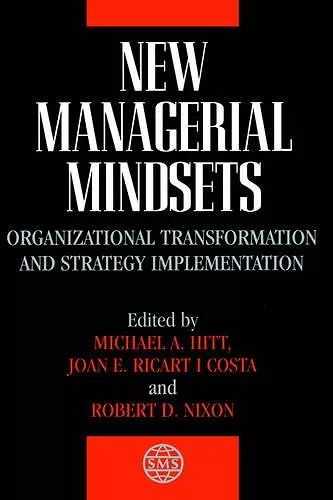New Managerial Mindsets
Organizational Transformation and Strategy Implementation
Michael A Hitt editor Robert D Nixon editor Joan E Ricart I Costa editor
Format:Hardback
Publisher:John Wiley & Sons Inc
Published:29th Oct '98
Currently unavailable, and unfortunately no date known when it will be back

New Managerial Mindsets Organizational Transformation and Strategy Implementation In order to make sense of the new frontier of business, which entails rapid and unpredictable changes, strategic discontinuities, economic uncertainties and hypercompetition, new forms of managerial thinking will be required. The new thinking, or 'managerial mindsets' need to be global in orientation and allow strategic and structural flexibility in an integrated way. A major part of staying ahead in the new business climate will depend on organizations having the capability to create and implement strategic and structural changes that entail continuous technological improvements, particularly in the area of IT. While the importance of IT to business is widely recognized and reported, organizations still have difficulty in harnessing its true potential, namely, the ability to transform industries and markets. Flexible organizational networks that build and share the knowledge of its employees, suppliers, customers and competitors and keep pace with technological advances are the way in which companies with completely new mindsets will stay one step ahead. The editors have selected contributions that address two major themes of this new business environment and the means of managing strategically within it. Part I: Interconnected Thinking: Managerial Mindsets, Information Technology and Organizational Change looks at the shared, interconnected mental framework required throughout a firm's managerial ranks. It is based on sensemaking that represents an intangible structure in the firm. IT supports sensemaking and, thus, managerial mindsets through linkages in a managerial network and the information that flows through this network. IT is particularly important for development and the implementation of strategy and provides a form of structure to organizations. As such, IT and strategy must be aligned. Through the structure and the information that IT provides, comes the need for a firm's strategic flexibility. Managerial mindsets oriented toward change and flexible IT architecture facilitate organizational transformations. Part II: Interconnected Perspectives: Strategies, Competencies and Performance raises the importance of integration between strategy formulation and implementation processes. For example, mission statements can provide useful guides for, not only the formulation, but also the implementation of strategy. Implementation processes are particularly important for successful strategic change. A key element in implementation of strategy and strategic change is the managerial reward system. Managerial compensation affects managerial actions (e.g. to promote resource sharing across business...
ISBN: 9780471986676
Dimensions: 238mm x 161mm x 26mm
Weight: 680g
370 pages